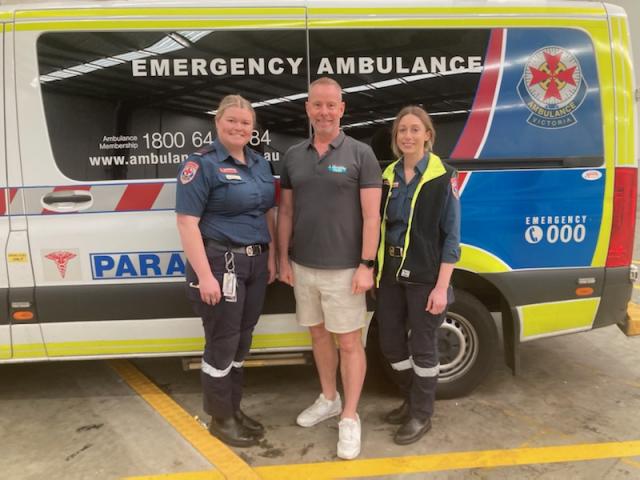Westmeadows paramedics Rhiannon Smith and Shelley Portelli have been reunited with a Moonee Ponds father they helped treat after he experienced stroke-like symptoms to mark National Stroke Week.
Roger Sutherland was telling his partner a story about his daughter in June 2020 when he started to feel unwell and collapsed on the road.
“We were taking an afternoon walk and before I knew it, I buckled on the nature strip, and experienced a left-sided facial droop, numbness, tingling, my words were slurred and I lost the ability to move my hand,” he said.
“I knew exactly what was happening, but I couldn’t get the words out – I couldn’t get the attention of my partner and I was petrified.”
The then-55-year-old was having a transient ischaemic attack (TIA) that happens when the blood supply to the brain is temporarily blocked.
The signs of a TIA are the same as stroke, but they disappear within a short time and are often, only present for a few minutes.
Earlier that day, the health and wellbeing coach had done a weight session at the gym.
When Roger’s partner noticed stroke-like signs, she immediately called triple-0 () and two ambulances arrived quickly; one being the Mobile Stroke Unit (MSU).
Ambulance Victoria (AV) Advanced Life Support (ALS) paramedics Rhiannon Smith and Shelley Portelli started treating Roger just before the MSU arrived on scene.
He was taken to the Royal Melbourne Hospital where the TIA was confirmed and investigated.
In June this year, Roger marked two years since surviving his TIA which puts him at risk of future strokes.
“My doctor was horrified I had this attack; and the neurologists attributed the cause of the TIA to incredibly high stress-levels,” Roger said.
“I was lucky I haven’t suffered any deficits as a result, but this episode has totally overhauled my mentality and changed how I worked.”
Roger was a shift-worker for almost four decades and after taking five months off work after the TIA, decided to change course and start coaching other shift-workers in health and nutrition.
“I coach other shift-workers in health and well-being, purely based on my experience with stress, which I have personally found is so important to get on top and raise awareness of,” he said.
“I’m now 58-years-old and full of beans.”
During National Stroke Week, Roger wants to encourage people to become familiar with the common signs of a TIA which mimic a stroke, which include, Facial droop, inability to lift Arms, slurred Speech
and Time – the F.A.S.T signs.
“Stroke and TIAs don’t discriminate, and as I found out, these episodes can happen to anyone at any age, so it’s important to learn the signs so you can seek treatment immediately,” he said.
“Rhiannon and Shelley were both so empathetic and caring; I know this is expected from Ambulance Victoria paramedics but they were exactly that – I’m eternally grateful to them, not forgetting the MSU
crew who I am also extremely grateful of as well.”
National Stroke Week runs from August 8-14







